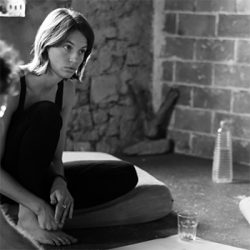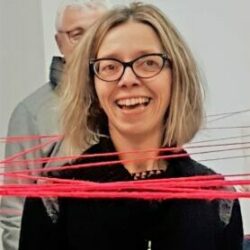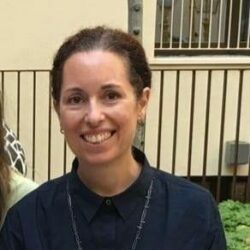learning to act with systems awareness
This course offers tools, frameworks and practical skills to increase the ability to adapt effectively in changing times and builds capacity for leadership and collaboration from the perspective of ecosystem awareness. This training is hosted as part of the Ulex South Project
Ecosystem awareness is a continuous process of:
We will focus on:
Contextual background:
Many sectors, including social movements and organising, focus on collecting data to gain information about a topic. Data might be quantitative : number of people at an action; how many refugees entered Spain in 2021, or qualitative: an increased sense of togetherness; a feeling of collective rejection. However, the feedback loop of ‘better data’ leading to ‘better social action’ is often weak or non-existent. This is due to lack of capacity for joined-up thinking or quality relationships between actors in the system. This means that potentially threatening or non-conforming ‘data’ is ignored or discarded, or people recognise the data, but still do little to change their actions. This is true around many ‘hot topics’ such as race and inequality, resource use, consumerism and climate chaos. We have enough high quality data – it is that we don’t have the capacity for joined-up thinking or relationships. In effect, the typical low quality of relational space (in a meeting or between social moments) diminishes the ability to ‘process’ (recognise, collaboratively probe and ultimately act on) non-conforming data. So rather than simply collecting more data and assuming that data will bring about change, we focus on the basic growth loop so that better data can lead to more effective collective action. Without practical ways of initiating and sustaining self-reinforcing processes that improve the overall relational space, better data will achieve little: when difficult problems arise, they will be neglected or dealt with only superficially.
The deep capacity and community building that drives the basic growth cycle never ends. This learning continues to unfold as new stakeholders are engaged and new problems are faced. As this develops, peer learning relationships become more important, both within the community and between the community and others doing similar work. Cultivating the internal and external forces that make the process resilient is central to our long-term vision and awareness of systems change.
Key areas of study and reflection include:
Personal: (to grow as a person) Awareness, presence, empathy; ability to manage emotions in order to learn to respond to unforeseen events; to contain emergency situations; to know how to enter into relationships in an empathetic way; to manage emotional boundaries in relationships.
Professional: (improve one’s relational skills) Priority of relationship as a tool for care. Professionalism capable of empathy. Overcome the logic of doing, to focus on how. Being with the person in the here and now of the relationship, in authenticity and congruence with one’s own feelings. Knowing how to listen to needs, renouncing pre-packaged solutions.
Organisational: (improve one’s ability to co-create). Prioritise collaborative communication with the various professionals involved. It is important to be able to recognise and value the ways in which different professionals operate in order to assume a collaborative attitude.
Specific objectives:
Methodologies
The methodology adopted is participatory and experiential and includes individual and group work, simulations and role-playing, reflection on theoretical material, embodiment practices, group exchange, projection of audiovisuals, theory class, personal production . The use of feedback will also allow participants to acquire greater awareness of their own path in relation to the skills covered.
Bibliography
This course is specifically designed for:
In the solidarity economy:
(See details of our approach to radical economics here)
Contact us
to apply

Location:
Ruth Cross is co-founder of Eroles Project – an international learning for action centre, and, Asociación La Bolina – a visionary intercultural initiative working to regenerate land and lives through creating social integration and sustainable livelihoods for locals, migrants and refugees in El Valle, Andalucia, Spain. She is the Artistic Director of Cross Collaborations, an award winning arts for change immersive theatre company.
Ruth is an experienced arts activist, social theatre maker, researcher and educator specialising in instigating transformative and regenerative change. She can be found directing immersive performance with migrants and refugees, creating participatory arts action campaigns and coordinating cross-disciplinary projects with organisations, decision-makers, civil society and local communities.
For the last 10 years Ruth has facilitated capacity building training with activists and social movements. She is a research contributor with Schumacher Research in Action community, is a member of the international Delicate Activism community and of Social Arts network ImaginAction. As well as a collaborator with Asociación Solidaria Andaluza de Desarrollo (ASAD).

Location:
Roberta is a trainer, drama coach. She has specific training in social theatre, including: Teatro Nucleo in Ferrara (Italy), CETT (Center for Theatre in Therapies) in collaboration with the University of Ferrara, on the topic of social discomfort and International Integrated Theatre at the Academy of Expressive Arts in Rome (Italy). By integrating different body and theatre disciplines and knowledge in the field of psychology, he created the LIA training method “Lab-IntegrArte”. She leads courses for people with mental and physical disabilities. She coordinates different projects in the field of theatre and psychiatry. As a trainer her activity is aimed at different areas: social, academic, health and business. She has worked abroad: Ethiopia (Africa), La Habana (Cuba), Argentina, Spain, and holds a degree in Psychology of Work, Degree in Conservation of Cultural Heritage and Operator in Evolutionary Biomusic

Location:
Marina Seghetti is founder and trainer at ParamitaLab. She holds the space for others, to offer a generative and connective environment. Through her work, she explores and unfolds the invisible, building bridges between the tangible and the intangible. She has dedicated herself to working with groups and individuals. She participates in independent research groups with the aim of studying the development of ethics and integration between religions and cultures. She studied education and institutional – organisational psychology, specialising in the psychoanalytical field. Until 2015 she worked in the education sector and in public administration. Since 2015 she has been working independently from ParamitaLab to facilitate transformation processes in the individual, educational, community and institutional fields. She is a volunteer member of the Presencing Institute’s Holding Team.

Location:
Débora currently is a systemic organisational and social consultant and facilitator. Through her work she supports the process of achieving organisational and social transformation in collaboration with an experienced multidisciplinary network. The essence of her practice is to generate higher levels of individual and collective consciousness and empower people to realise their full potential. She draws on the techniques Theory U, Social Presencing Theatre, Mindfulness and emotional intelligence to first bring awareness and from there transform the narrative and in consequence behaviours and culture. She also runs training in diversity and inclusion. She is also a field researcher, and she uses the frame of psychoanalysis approach to do so. She is also a Vipassana Practitioner. She has been teaching at University since 2010. Currently, she teaches Organisational development as an Associate teacher at a Master career at Universidad Nacional de Lomas de Zamora and also a guest teacher at different universities. She is driven by a high sense of social justice as well as a strong support of sustainability and well-being, and she believes in our individual responsibility to introduce constructive changes that will improve the systems that we are part of.

Location:
An Maeyens (she/her) is a facilitator and trainer with over two decades of experience in grassroots movements. She specialises in creative, inclusive agenda design and brings deep expertise on group culture, power dynamics, and transformative learning. Starting of in the anti-globalisation movement she has trained thousands in civil disobedience, supported international coalitions, and developed multilingual training programmes and toolkits. Her work spans movements, cultures, and countries, guided by a commitment to care, accessibility, and leaderful organising.

Location:
Ari’s activism began in 2002, at age 16, as a Bosnian refugee in Canada, where they founded and coordinated a group for LGBTIQ high school students and allies. They were a co-founder and leader at kolekTIRV in Croatia and Trans Network Balkan, involved in community organizing, advocacy, program management, team coordination, capacity building, education, media work, campaigns, events, fundraising, etc. In 2024, they joined the Supervisory Board of the Croatian Trade Union Collective of United Precarious Workers and Activists (SKUPA).
Beyond the Balkan region, Ari served as a Board member at Transgender Europe (TGEU), where they held roles as Secretary, Treasurer, and later Co-chair. They have also been a trainer with the Center for Artistic Activism and served on the Advisory Committee and since 2022 as a Community Care Facilitator at FRIDA — The Young Feminist Fund. Since 2024 they are the Operations Manager at Global Philanthropy Project.

Location:
Sergio (all pronouns) was born in Romania and migrated to Germany in the early 2010s. In the past, he was a social worker with homeless people and a social consultant for Eastern European migrants for various organisations. Trained as a filmmaker, he spent two years making a documentary about the ‘civic reawakening’ in Romania and the waves of protest it brought with it. In connection to this, Sergio is currently co-steering the development of an online open-source participative knowledge production platform on activism in Romania. Over the past nine years, Sergiu has offered his skills to various journalists, grassroots collectives and campaigns, mostly working within the labour rights, climate justice, international solidarity and anti-authoritarian movements in Germany and Romania. Nonetheless, his biggest focus since 2020 has been his work as an organiser with the anarcho-syndicalist Free Workers Union, where he focuses mostly on organising Romanian migrant workers on construction sites, in factories and in the agricultural field.

Location:
Linzy Na Nakorn is a movement director, politicised somatics practitioner, community organiser and facilitator. For the past decade she has been facilitating movement, body work and creating theatre, dance and participatory performance that advocates for and organises with communities in pursuit of housing, disability and racial justice. Her movement practice focuses on trauma-informed approaches to building resilience, capacity and joy via way of the body for personal, interpersonal and community sustainability. Linzy was a Co-Director of The Big Ride for Palestine in partnership with The Gaza Sunbirds, Native Woman Ride and Middle East Children’s Alliance; using cycling as a tool for mobilising active solidarity and in support of campaigning for the rights and self-determination of the Palestinian people. Linzy is part of a UK network of activists and artists advocating for Radical Care – supporting organisations, researchers and institutions to work towards system change in societal approaches to labour, leadership and access.

Location:
Jeroen (he/him pronouns) has been involved in grassroots social movements for more than two decades now, starting back when he was fifteen. Throughout the years the fights for “climate justice” and “migrant justice” have been consistently on top of the list of struggles that make his heart beat faster. A key transformative moment for Jeroen was reading Paulo Freire’s Pedagogy of the Oppressed. Freire’s revolutionary pedagogy gave him a language to support the creation of emancipatory learning environments, rooted in a desire for collective liberation. Jeroen has also been exploring in depth Boal’s Theatre of the Oppressed and Joanna Macy’s The Work That Reconnects among other methodologies to build his trainer’s toolkit. Inspired by the liberatory possibilities of these traditions, he started an organization with a friend, LABO vzw, based in Belgium, where he has worked as a trainer and campaigner between 2013 and 2023.

Location:
Ella brings more than 10 years’ external experience working with not for profit and community based organisations across diverse themes including: advocacy for migrant communities; local community engagement in national policy making; and structural relationships between poverty and disenfranchisement, and education and poverty. Immersed in critical theory in her early 20s she brings a holistic and questioning approach, and is passionate about systemic solutions that centre relationship and interconnection between ecology and society. A long standing member of the collective, Ella has been part of the core team since the inception of the Ulex Project. Her work bridges facilitation, developing project partnerships, governance, strategy, operations, and project and programme evaluation. She has developed and overseen more than 70 partnerships with a range of different actors across European social movements.
Ulex: Latin (argelaga Catalan, gorse English) noun:
1. A thorny-evergreen flowering shrub, with a high capacity for regeneration and resilience. Its seedpods open in contact with fire and it reshoots from charred stumps. A successionary plant that grows well under challenging conditions. It improves soil fertility through nitrogen fixing, preparing the way for renewed biodiversity.
2. A traditional choice for igniting fires. Burns hot and bright.
3. A networked project adding nutrition and fertility to European social movements through training and capacity building. It kindles the realisation of social justice, ecological intelligence, and cognitive vitality.